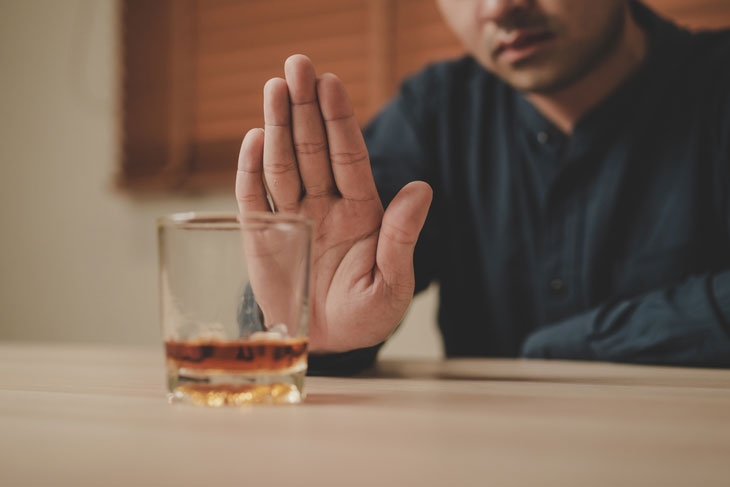Misuse of alcohol can impact military health, performance, and readiness. Knowing the limits on moderate drinking (and the health and legal consequences of going above that) can help Service Members make informed decisions about their drinking behavior.
Service Members must be at least 21 years of age to buy or drink alcohol in the U.S. There might be exceptions in certain situations, especially if you’re serving abroad. If you’re not sure about the age limit in your specific location, check first with your Base Command.
Know your limits
The Centers for Disease Control and Prevention (CDC) sets clear guidelines around moderate alcohol intake. One drink consists of a 12-oz beer, 8-oz glass of malt liquor, 5-oz glass of wine, or 1.5-oz shot of liquor. For women, moderate drinking equals having one drink or less in a day, and for men, 2 drinks or less. A blood alcohol concentration (BAC) of 0.06% is enough to impair aspects of cognitive performance, including reaction time and working memory. The number of drinks needed to reach this level varies with gender, weight, and the amount of time since the first drink. A 200-lb man, for example, reaches this BAC after consuming 4 drinks within 3 hours.
In most states, a person is considered legally intoxicated after they reach a BAC of 0.08%. The only exception is Utah (0.05% BAC limit). Some military installations, particularly outside of the U.S., might adopt a BAC limit of 0.1%. So, make sure you ask your Base Command about safe limits for alcohol consumption.
Know the consequences
The Uniform Code of Military Justice (UCMJ) sets the guidelines on alcohol-related offenses and their punishable consequences.
- Drunkenness is defined as being unable to perform military duties due to overindulgence in alcoholic drinks. This inability to perform happens as a result of ongoing intoxication or a hangover. Punishment for breaking this rule might include confinement for 3 months and forfeiture of two-thirds of pay per month for 3 months.
- Disorderly conduct as a result of drunkenness. This happens when excessive alcohol intake leads to behaviors that disturb the peace and quiet of others and the environment. Some examples include aggressive or disruptive behavior and conduct that threatens public safety. Punishment for disorderly conduct includes confinement and forfeiture of two-thirds pay per month for up to 4 months.
- Drunken or reckless operation of a vehicle, aircraft, or vessel. The BAC limit imposed by the law governing the military installation (usually either 0.08% or 0.1%) defines “drunkenness” in the case of operation or physical control of a vehicle, vessel, or aircraft. Conduct is considered “reckless” when the person shows lack of concern for the consequences of the irresponsible act. If personal injury happens as a result of the misconduct, Service Members can face dishonorable discharge, forfeiture of all pay and allowances, and confinement for 18 months. If no personal injury occurs, punishment includes bad-conduct discharge, forfeiture of all pay and allowances, and confinement for 6 months.
- Drunk on duty. The term “drunk” relates to any level of alcohol intoxication that impacts mental and physical performance. The term also refers to any assignment imposed by a superior authority which is considered a military duty. This type of misconduct can lead to a maximum punishment of bad-conduct discharge, forfeiture of all pay and allowances, and confinement for 9 months.
Know where to get help
Excessive alcohol consumption isn’t a sign of weakness or character flaw. It happens as a result of changes in brain function which make it hard to self-regulate drinking behavior. If you frequently binge on alcohol, you might benefit from seeking help, as a strong will and self-control might be ineffective in changing your behavior. Multiple resources and programs are available.
Each branch offers alcohol and drug abuse prevention and treatment programs.
- Army
- Air Force
- Navy
- Marine Corps
- Coast Guard
VA services: Substance use treatment. Veterans who experience problems with alcohol, tobacco, or other substances can seek help from the VA. Services include drug and alcohol screenings, counseling services, and in-patient treatment programs.
Drug Demand Reduction Program. DoD helps educate civilian and military personnel about the dangers of drug misuse and abuse. You can also learn about policies, education and outreach programs, and drug testing procedures.
Own Your Limits. This DoD campaign addresses alcohol abuse to help educate Service Members on the various impacts of excessive alcohol use on health and wellness. The goal is to encourage responsible drinking and reduce excessive drinking, especially among young, enlisted Service Members. In addition, the website offers a variety of tools and resources, including a BAC calculator and other campaign materials.
Substance Abuse and Mental Health Services Administration (SAMHSA) resources:
